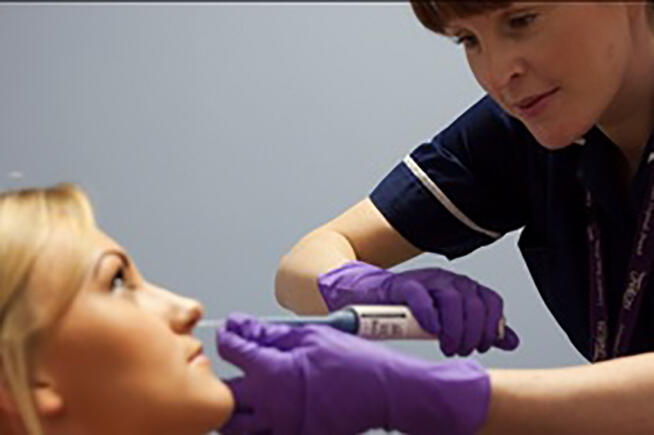
LSTM’s Seminar Series continued this week with a talk from Professor Stephen Gordon, head of LSTM’s Department of Clinical Sciences. Professor Gordon delivered a presentation entitled “Human Challenge Studies in Pneumococcal Vaccine Discovery.”
Professor Gordon began by looking at the global burden of pneumococcal disease, explaining that while the disease kills older adults in Europe, it predominantly affects children under five in developing countries and kills more children worldwide than HIV/Aids, Malaria and measles combined. In terms of vaccinations he explained that they have mostly been used in higher income countries. Different vaccines have been used for children and older adults, but both are more effective at preventing invasive disease than pneumonia and otitis media.
Professor Gordon then went on to look at the pathogenesis of pneumococcal disease, how it can cause ear infection, sinusitis or more seriously when in the lungs, pneumonia, or in the brain meningitis. He examined the role played by different proteins and antibodies offer defence against the disease.
In terms of vaccine research, as current injected vaccines using capsule as the antigen are more effective at preventing infection in the blood or brain (sepsis or meningitis), then potentially inhaled vaccines might be more effective to tackle the disease in the lung, pneumonia. Professor Gordon discussed a previous study that had been carried out in which subjects inhaled the antigen pneumococcal polysaccharide, but that had failed, which he attributed to the manner in which the lung defence deals with polysaccharide.
In 2007, Professor Gordon and his team developed the Experimental Human Pneumococcal Carriage model, which utilises bacteria itself, rather than antigens, placed directly in the nasopharynx of a healthy volunteers in order to both promote pneumococcal carriage and immunise the volunteer to the bacteria. So far over 300 people have taken part in testing the model, the team have completed one vaccine trial and are about to start another commercial vaccine study testing a novel vaccine. The work so far has established that the model enables the team to study immune defences, design new vaccines and test novel vaccines using fewer subjects, over a shorter period and at a fraction of the cost previous vaccine trials.
Professor Gordon concluded by looking at the current work streams of team which include tweaking the current EHPC model, looking at the host immune response, host susceptibility, response to novel vaccines and pneumococcal biology.
For more information on the Respiratory Research Team activities visit the website: